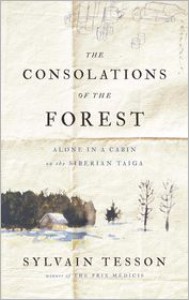
Radical Russia

For an intentional hermit, wilderness trekker Sylvain Tesson has a surprising amount of company during his six-month retreat in Siberia. Though he deliberately exiles himself to a remote one-room cabin for solitary contemplation, he ends up developing new relationships with his environment, its animals, and its human population as well.
In The Consolations of the Forest: Alone in a Cabin on the Siberian Taiga, Tesson shares the detailed journal of his days in what should be the bleakest corner of the planet, but which turns out to be a rich and varied experience.
Winner of the Prix Medicis for nonfiction in his native France, this English translation of Tesson’s Dans les Forets de Siberie gives the prolific travel writer an expanded audience. Readers from across the globe are invited to join the intrepid traveler as he ventures into the subarctic realms with only his books, his vodka, and a sustaining supply of pasta and Tabasco sauce. On the shores of Lake Baikal, he sets out to conquer an ambitious reading list that includes Nietzsche, Sade, Camus, and Shakespeare. After all, he has six months to fill.
The time fills more quickly than either Tesson or his readers expect. First, there are the basics of survival. (As the Zen proverb says, “Before enlightenment, chop wood, carry water.”) Then, there are the visitors. The daily conversation with a titmouse at the windowsill and the constant lookout for bears occupy many hours. So, too, do the surprisingly frequent visits from Tesson’s Russian counterparts, who live in the forest to safeguard the wildlife against the threat of poachers.
Tesson never knows when a “neighbor” from seventy-five miles away will crash through his door. Sausages and seal meat are slung on the table, vodka is passed around, and raucous conversation flies across the room at top speed and volume. And then, just as suddenly as they appear, the visitors take off. It’s contrasts like these, between solitude and companionship, that make Tesson’s story fascinating.
Tesson’s writing is most evocative when he concentrates on the tangible details of his days—his trek “over sheets of lunar ice that resemble huge jellyfish veined with turquoise,” for example. These passages create vivid images in the reader’s mind, although Tesson occasionally gets carried away by the metaphorical possibilities, as when he imagines “the melancholy of forests, the joy of mountain torrents, the hesitation of bogs, the strict severity of peaks, the aristocratic frivolity of lapping waves.”
With The Consolations of the Forest, Tesson adds a modern voice to the rich literary history of contemplative nature writers like Thoreau and Emerson. Tesson reaches few conclusions, but rather asks readers to accompany him as he explores the question of people’s relationship to nature and each other.
Sheila M. Trask for ForeWord Reviews
August 31, 2013



